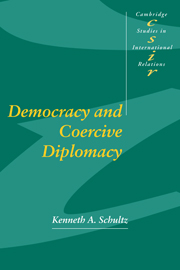Part II - Empirical analysis
Published online by Cambridge University Press: 08 October 2009
Summary
What can we learn from the informational perspective on democracy developed in the preceding chapters? As noted at the outset of this study, interest in the democratic peace has generated a large number of studies exploring the empirical relationship between democracy and conflict behavior. Hence, any new perspective on this topic has to show that it generates new, previously unanticipated empirical regularities and that it provides a better accounting for these regularities than do existing theories. The purpose of this second part of the book is to do precisely that. The empirical tests probe the theory's predictions from two different levels of analysis. The hypotheses tested in Chapter 5 are at the level of regime type. They explore how the effects identified here influence the overall relationship between domestic institutions and observable crisis outcomes. While the crisis game can play out in many different ways depending upon the exact circumstances, domestic institutions pattern behavior in ways that generate effects “on average.” The statistical tests seek evidence of such effects over a large number of observations. The hypotheses tested in the two subsequent chapters are at the level of strategies. Using a mixture of statistical and historical analysis, they explore how the strategies of government and opposition within democratic states influence one another and decision makers in other states. Thus, while the tests in Chapter 5 focus on the differences between democracies and nondemocracies, those in Chapters 6 and 7 focus on the differences between supported threats and opposed threats, unity and dissent.
- Type
- Chapter
- Information
- Democracy and Coercive Diplomacy , pp. 117 - 118Publisher: Cambridge University PressPrint publication year: 2001



